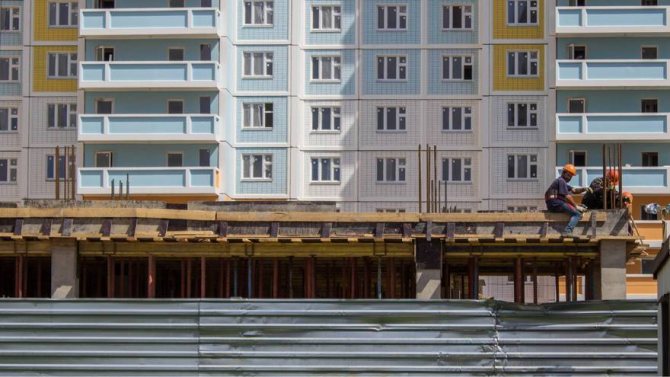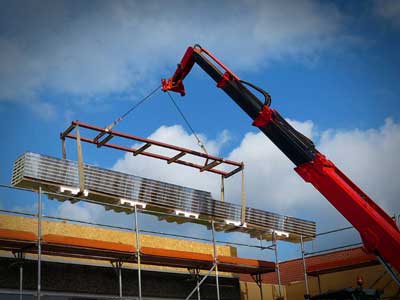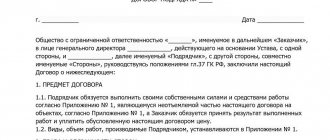An effective protection mechanism in shared construction
The most common scheme for acquiring primary housing is participation in shared construction.
In addition, this transaction format is the most protected for the buyer from a legal point of view.
Alternative methods of acquiring real estate (such as, for example, housing cooperatives or purchasing under a preliminary sales agreement)
cannot ensure the protection of his interests.
Actually, civil liability insurance of the developer to shareholders is one of a number of mechanisms through which the buyer has the opportunity to get back the invested funds if something goes wrong. In the case of alternative methods of acquiring real estate, such a mechanism is not provided, so the buyer who transfers money against promises (albeit recorded on paper)
, there is no guarantee that he will be able to get an apartment or get his money back.
Of course, in the event of a trial, the court will side with the buyer and oblige the development company to return the amount paid.
But what to do if by the time of the court decision the company simply ceases to exist or the management disappears in an unknown direction, wiping out the accounts?
Liability Insurance Options

The area of shared construction is regulated by Federal Law No. 214, which regulates the relationship between the developer and the shareholder.
The law is periodically amended, the document becomes more perfect, new mechanisms for protecting the interests of shareholders appear, and since 2014, developers have been required to take out civil liability insurance for each property.
That is, since January 2014, it has become possible to register a child-care facility with Rosreestr only if you have the appropriate insurance. Liability insurance may exist in one of the following options:
- Bank guarantee .
The credit institution covers the financial obligations of the developer to shareholders in the event of unforeseen situations; - Liability insurance contract .
Issued by an insurance company with the possibility of subsequent risk reinsurance.
An insurance contract can be concluded not only with an insurance company, but also with the Developers Mutual Insurance Society. By the way, in the case of drawing up such an agreement, the document must be signed before the first DDU for the facility being built is registered. After which the developer is responsible for informing shareholders about where the insurance was issued, as well as informing about the conditions and rules of insurance.
Shared construction insurance mechanism
On January 1, 2014, Law No. 214-FZ came into force, according to which all construction companies registered in Russia began to bear responsibility to citizens investing their funds in the construction of new housing.
Shareholders entering into construction agreements bear the financial risk of bankruptcy of the developers. To protect their rights, the state introduced a procedure for compulsory liability insurance for construction companies. From that moment on, each contractor began to attract investors only under an equity participation agreement.
Later, on July 29, 2017, No. 218-FZ came into force, according to which the procedure for protecting participants in shared construction, which existed under Law No. 214, was clarified, namely, the obligations for the developer to insure liability from insurance companies were canceled, and at the same time the obligations for the contractor to make contributions to State Fund for the Protection of Shareholders, after the date of formation of such a fund.
According to the letter of the Ministry of Construction No. 44458-NS/07 dated December 1, 2017, this fund was organized on October 20, 2021. Thus, in accordance with Art. 10 of Law No. 218, from this date, developers are required to transfer compensation contributions to the state fund for each concluded agreement on shared construction.
The insurance law works as follows: the developer, before signing a share participation agreement with the first shareholder, is obliged to take measures to insure his own liability to the investor. If a construction company has financial problems, goes bankrupt and is unable to fulfill its obligations under the LDU, the shareholder can contact the organization that insures the developer’s liability and demand compensation from it.
The developer has no choice whether or not to insure his liability; this is his responsibility, otherwise not a single agreement on this project will be registered with Rosreestr. However, the law provides the developer with the opportunity to choose the insurance method from three available options:
- Obtain a guarantee from a banking institution that complies with legal requirements.
- Become a member of a company that provides mutual risk insurance.
- Sign an agreement with one of the insurance companies that meets legal requirements.
The developer must notify the potential equity holder of the chosen option and provide him with information about the insurer or guarantor.
The first two methods are rarely used. OBC is not very common in Russia; obtaining a bank guarantee is quite difficult and expensive. As a rule, banks require collateral, the minimum amount of which is 30% of the value of the property. Therefore, most often construction companies choose the third option.
a) carrying out insurance activities for at least five years; b) the presence of own funds in the amount of at least one billion rubles, including authorized capital in the amount of at least 120 million rubles; c) the absence of instructions from the Central Bank of the Russian Federation on non-compliance with requirements for ensuring financial stability and solvency;
d) absence of grounds for applying measures to prevent bankruptcy of an insurance organization in accordance with Federal Law of October 26, 2002 N 127-FZ “On Insolvency (Bankruptcy)”; e) absence of a decision of the Central Bank of the Russian Federation (Bank of Russia) on the appointment of a temporary administration insurance organization;
A list of shared construction insurers is posted on the website on December 15, 2015. It includes 18 insurance organizations and one mutual insurance company.
During this time, investors have the right to make demands on the developer regarding the quality of the apartments.
Developer's responsibility
It is quite difficult for ordinary citizens who invest their money in construction to figure out what the right thing to do is.
The amount of compensation is calculated based on the average market value of one square meter of housing multiplied by its total area.
The developer is obliged to carry out liability insurance for failure to fulfill his obligations at his own expense.
Regardless of which insurance method was chosen by the developer, it is his responsibility to notify all interested parties about the insurance conditions and existing features that are worth paying attention to.
If the beneficiary changes under the contract, the insurer must be notified of this.
| Conclusion of an insurance agreement | before funds are received from equity holders |
| Providing required information | to all interested parties |
| Register | contracts in Rosreestr |
Companies making the deal
The developer is obliged to ensure the fulfillment of obligations under the contract in one of the following ways:
- bank guarantee (guarantees);
- civil liability insurance for the developer.
Bank guarantees

Banking companies agree to sign agreements of this kind if there are accurate estimates of the cost of constructing an apartment building.
| Availability of a valid license | issued by the Central Bank of the Russian Federation |
| Conducting activities | at least five years in the banking services market |
| Authorized capital of the bank | should not be less than 200 million rubles |
Financial risks
According to the law, agreements for shared participation in construction must be registered with the authorities whose competence includes state registration of real estate objects and transactions with them.
The fact that the contract has been concluded confirms that the developer has all the necessary documents to begin construction.
Despite these norms, the law cannot fully protect shareholders.
Therefore, the law, first of all, is aimed at implementing interaction between the developer and the construction participant when selling new houses under construction, in the event that the developer finally completes the house.
In this case, despite the legal rights of shareholders, it will be quite difficult to return the invested funds, including penalties.
This legislative act confirms that shareholders are recognized with the right of ownership of the building as an object of unfinished construction, upon the commencement of bankruptcy proceedings and bankruptcy of the developer, or the return of the contributed funds under the agreement.
Companies must provide collateral. Most often this is the land plot on which the object will be located. In addition, the document describes how to secure obligations. The papers are signed before the state registration of the first share agreement and are valid until the object is handed over. Termination of the transaction does not relieve the company from the obligation to pay compensation for events that occurred during the period of its validity.
You can insure the entire house or each apartment separately. The first option is unprofitable. The developer needs to immediately deposit a large amount and be sure that all apartments will be sold. The second problem is that under such agreements it is difficult to determine who the beneficiary is.
Policy validity: grounds, amounts and terms of payments

Thus, when concluding a DDU agreement, an insurance policy is simultaneously drawn up, where the beneficiary is the shareholder
– only he can receive compensation in the event of an insured event. An insured event is the fact of failure by the developer to fulfill its obligations, which is confirmed by the relevant court decision, the basis for which is the statement of claim of the shareholder. In addition, the basis for payment made by the insurer in favor of the shareholder may also be the fact that the developer has been declared bankrupt.
Now let’s look at how the insurance premium is calculated, because it is not easy to evaluate non-existent real estate, which, by the way, begins to rise in price immediately after signing the agreement and continues to add to the value until the house is put into operation.
The amount for payment is determined based on the total cost of square meters of area according to the DDU, and is adjusted (at the time of payment) with the average market value of a square meter of residential real estate in the region.
Regarding the validity period of the insurance policy, the terms are determined based on the amount of time that the developer is allotted under the DDU for carrying out all construction and finishing work and according to the project declaration.
Actually, this circumstance quite often served as a loophole for unscrupulous developers.
After the shareholder filed a statement of claim, the developer’s lawyers, without serious difficulties, delayed the process until the house was built and put into operation. Which, by the way, happened after the expiration of the insurance policy - in this case, the shareholder no longer had the opportunity to claim any compensation.
Did compulsory insurance live up to expectations?

So, civil liability insurance of the developer was conceived as a measure to further protect the rights of shareholders (along with the mechanisms that were already present in Federal Law-214)
.
Thus, to the assets that secured the developer’s obligations to shareholders (mortgage on the land and the building under construction)
, there was also added the opportunity to receive monetary compensation under insurance.
Accordingly, payments must be made by the insurance company or bank that vouched for the developer, or by the Mutual Insurance Society.
The developer was forced to take out an insurance policy, or join the OVS and pay certain amounts as insurance premiums, or somehow interest the bank so that the credit institution would take on its risks.
However, despite the possibility of a guarantee, which the legislation allowed, banks quite actively distanced themselves from it, since, firstly, it was quite expensive, and, secondly, it was not necessary for the banks themselves.
Although there were precedents, in most cases it was about banks that were directly involved in financing construction or banks that were accountable to the same structures as developers.
Based on the results of several years of work with mandatory developer liability insurance under the DDU, it was discovered that this measure does not work as effectively as it was expected before the adoption of the relevant law. As a result of the analysis of this measure, compulsory insurance for developers had to be abandoned, and since 2021, parts 1 and 2 of Article 15 of Law FZ-214 have lost force.
This means that now the developer’s liability insurance through a bank guarantee and through the issuance of an insurance policy is not mandatory. The developer has the right to insure liability, but only voluntarily - needless to say, none of them plans to do this, since the corresponding costs fall on the shoulders of the same shareholders by increasing the price per square meter of living space.
Features of the insurance contract
An agreement between the developer and the insurance organization is signed before the conclusion of the DDU, but it comes into force only after the share participation agreement is registered. The validity period of the insurance depends on the period of transfer of housing specified in the DDU. By law, the shareholder can use the insurance for another two years after the period for transferring the property under the contract expires.
The shareholder can transfer his rights to the paid object to another participant by signing an assignment agreement with him. This does not affect the validity of the insurance in any way. It automatically transfers to the new investor. The developer notifies the insurer about the change of participants in the DDU and the parties sign an additional agreement indicating the new shareholder.
By law, the developer can insure the entire property in one insurance organization or each share participation agreement separately. Typically, construction companies resort to the second option, which they consider more profitable. However, this option is also more preferable for shareholders, since in this case the developer is responsible to each participant separately.
The compensation that the shareholder will receive upon the occurrence of an event specified in the insurance is calculated in accordance with the price of the apartment according to the DDU. The minimum payment amount must be no less than the average price of a similar apartment in a given region. The legislator prohibits the insurer from establishing a deductible (the amount of losses that are not compensated under the contract).
The developer does not have the right to terminate the contract with the insurance company without legal grounds without the consent of the shareholder. If the insurance company’s license was revoked, it stopped working, and the insurance contract was terminated, the developer must sign an agreement with a new insurer no later than two weeks.
Developer liability insurance for shared construction is carried out through a bilateral agreement. At the same time, the shareholder, despite the fact that he receives some benefit, does not interact directly with the insurance company.

If an agreement is concluded with a shareholder, it is registered with Rosreestr. The insurance contract for shared property begins to be valid from the moment of registration. It is worth understanding that the insurance contract is valid for two years longer than the equity participation agreement itself under Federal Law 214. Check the developer's liability insurance contract. It must indicate:
- The amount that the shareholder should receive in the event of force majeure situations and the entry into force of reasons for insurance compensation.
- Please note that the cost of payment is not less than the average price for an apartment in the federal subject where you are purchasing it.
- Check the terms of payment - term, method, etc.
- Make sure that the details of all interested parties are indicated - the developer, the insured, the insurer.
The developer's insurance liability occurs in the event of a number of reasons listed in Art. 15 of Federal Law No. 214.
The developer is also obliged to provide an insurance contract for state registration each time for subsequent contracts on shared participation in construction, if they were signed with other shareholders.
When registering an agreement on shared participation in Rosreestr, both parties to the agreement (the shareholder and the developer, or his representative) must come.
When registering an equity participation agreement, the necessary documentation is collected and, together with the application, submitted to Rosreestr, a receipt for receipt of documents is issued and a day is set for issuing the state registration certificate.
✔ When participating in shared construction, they were required to conclude an insurance contract, which cost a quarter of the cost of the apartment, is it possible to return the money after receiving the housing?
The developer must pay for the insurance. Although, of course, in practice there are cases of attracting funds from a shareholder.
I recommend that you write a written claim to the developer for a refund; if there is no response, go to court.
✔ The developer has gone bankrupt, who will handle the return of the money, where to go?
First, contact the arbitration court and wait until you are included in the register of creditors' claims. Next, contact your guarantor bank or insurance company. You can find out who insured the DDU in Rosreestr, since the registrar checks this information before registering the contract.
Shortcomings in the law on compulsory insurance

There was a certain logic in the law - it became possible to oblige the developer to insure liability,
otherwise, he was automatically deprived of the opportunity to attract funds in the DDU format, that is, he lost a significant share of potential buyers. However, a mechanism has not been developed that would require insurance companies to have the same interest. The latter did not want to endure colossal losses, which, of course, were not covered by insurance premiums.
Moreover, until some point there was no understanding of what to do if not only the developer went bankrupt, but also the insurance company that was supposed to cover the losses. For example, the owner of a development company had the opportunity to open an insurance company in parallel in order to comply with legal requirements, and then immediately bankrupt both companies if something goes wrong.
Subsequently, a number of construction companies were approved and were allowed to provide insurance in this area. However, this is a very risky business, which was reflected in the volume of insurance premiums - insurers did not want to incur losses and tried to compensate for them with premiums, as well as the opportunity to obtain reinsurance from larger companies. Due to premiums, the cost of housing inevitably increased, and the reinsurance market was very limited and did not have the appropriate capabilities.
There was only one more or less effective option for covering risks - OBC. However, developers were very reluctant to join the society, for the same reason that it was undesirable to issue insurance policies - high insurance premiums.
Increasing the cost of square meters due to the emergence of additional costs and, accordingly, reducing competitive attractiveness, was beneficial only to large development companies.
New reality: measures to ensure developer liability in 2021

However, the fact that the mentioned articles have lost force does not mean that the developer’s liability will no longer be ensured by anything.
The latest amendments to Federal Law 214, signed by the President of the Russian Federation at the end of 2018, involve the introduction of a number of new mechanisms that should ensure the protection of the rights of shareholders. In fact, the changes being introduced, despite their real effectiveness, were initially intended as temporary measures.
The fact is that in 2021 the government decided to abandon shared construction in principle , and within several years to transfer developers to a project financing scheme.
This scheme prohibits the sale of unfinished housing in any form, and involves project financing in the form of bank loans issued as collateral. Thus, buyers will be able to purchase only finished apartments, which can be inspected in a building that has already been put into operation. In this case, for the shareholder, any problems associated with the suspension of construction, delays, or bankruptcy of the developer are excluded.
Perhaps the only risk remains the quality of “hidden” work, which cannot be verified without special expertise.
So, here is the essence of the main legislative changes that will come into force in the summer of 2021:
Introduction of escrow accounts.
The meaning of such accounts is as follows: the funds collected by the developer do not go to his account, but to a special bank escrow account
(opened for each shareholder)
.
Using this money, the bank finances the construction, and the developer receives funds from shareholders only after the house is completed and put into operation. This measure will prevent the developer from misusing money (or, simply put, withdrawing it)
.
Creation of a state compensation fund. All developers will contribute money according to the volume of construction, and if the developer encounters problems, the construction of his building will be completed using funds from this fund.
What is the basis for payment of funds?
If the construction of the project is stopped and circumstances for which the developer was insured occur, then payments corresponding to the cost of the apartment are made by the insurance company in accordance with the contract. The grounds for cash payments are the following circumstances:
- a court decision that the company carrying out the construction of the facility has been declared bankrupt;
- a court decision made on the claims of shareholders to foreclose on the land on which the object being built is located.
As a rule, the developer insures not the entire residential building, but individual apartments, and he will be responsible to each participant separately.
Thanks to changes in current legislation that came into force in 2014, shareholders can feel protected from unscrupulous developers. However, all the same, before entrusting your savings, you need to carefully weigh everything, check the reliability of the insurance company, as well as the company conducting the construction and whether it has insurance. Only then can you be sure that the long-awaited housewarming will definitely take place.
The law establishes several insurance events that are grounds for applying to an insurance company for payment of compensation:
- A court decision on foreclosure on the subject of collateral has been adopted and entered into force. This decision is made on the basis of applications from shareholders submitted to the court six months after the construction of the facility was stopped or the deadline for transfer of housing occurred.
- The decision of the arbitration court that the construction company is declared bankrupt and bankruptcy proceedings are opened against it.
If the above events occur, the shareholder can apply to the insurer for monetary compensation. If the amount received during the bankruptcy of the developer does not cover the costs of the DDU, the shareholder may include the remaining funds in the register of creditors' claims in the bankruptcy case opened against the developer.
The developer's liability is insured, but this does not mean that you can be calm. Thus, payments under an insurance contract are made based on several points:
- An undeniable court decision that the builder has been declared financially insolvent, i.e. bankrupt.
- A court decision that shareholders have the right to collect the land plot on which the house is located.

It is worth considering that often insurance contracts are concluded for each apartment and share participation agreement separately, so the developer will be responsible to each buyer separately. It is in your best interest to start the process as quickly as possible to be the first to receive your payouts.
The developer himself can choose the insurance organization with which he will enter into an insurance contract, but each participant (shareholder) is issued an agreement that specifies the insurance of the shared participation agreement in construction.
All payments under the contract are made by the insurance organization, or the bank, if it is a bank guarantee.
Cases of refusal to pay:
- If the developer's construction activities are suspended or frozen.
- Housing construction times have been extended.
- If the developer goes bankrupt.
The amount of compensation for damage in the event of an insured event under the contract will depend on the cost of the share participation agreement.
However, this amount cannot be less than the cost of the apartment that the participant in the shared participation agreement wanted to buy and less than the average market value of similar housing per 1 sq. m. m. in the area where the construction of the new building was carried out.






